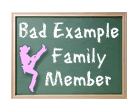I don't think that math is hard even though there are some maths which totally befuddle me (probability being the best example). However math, like most disciplines, requires building a foundation before erecting the house. I would like to write a proof for one of those interesting little factoids that arise in math. I don't know if it's feasible and I don't care. This is a fun mental exercise for me. But before I can even begin, I have to learn some additional math - my foundation isn't complete yet. It's a very good thing that I enjoy math.
Now getting to the title of this post. Earlier this month I had a short email discussion about the myth of mathematics. Actually, it wasn't that short and I'm going to copy the bulk of what I had to say here. But rest assured, there is no actual math in these posts - just my ideas and opinions.
The email exchange started with a request that I explain what it was that I called the myth of mathematics. This was my somewhat long winded reply.
I was then asked where the myth originated and answered as follows:I started thinking about this when I took the Praxis and some education classes. (I wasn't sure if I wanted to teach.) On average non-mathematics majors who were planning on teaching took the math section of the Praxis at least twice before passing. Many took it three or more times. I think the most retests I heard about was five. I wasn't overly concerned about the students who were planning on teaching English or History or anything that wasn't math or science, but virtually all of the students preparing to teach on the elementary level needed several tries before they passed. At the same time I kept on hearing "I can't do math, I'm bad at math, math is so hard." Well maybe I'd buy that differential equations are hard, but the Praxis math section is almost all arithmetic! So here are all these future elementary teachers who will have to teach arithmetic telling me that they can't do it, hate it, think it's hard, and so forth. And they're proud of it and see nothing wrong with repeating a basic test multiple times. At the same time, students who needed to retake the reading and writing sections would barely admit to that. Not passing the reading and writing section was socially unacceptable even for the math majors.
This is the mythology of mathematics - the belief that math is difficult and can only be done by "special" people. Math people are the priests in some esoteric religion that the ordinary man (or woman) is barred from. This is crap.
Before you can reveal the falsity of this myth, you need to understand that mathematics is not arithmetic. Just as you need to learn to count before you learn to add and subtract, you need to learn arithmetic before basic mathematics are accessible. Counting is a universal skill - baby's have a sense of number and basic counting skills before they are verbal; many animals also exhibit an awareness of numerosity and number sense. Baby's understand that if you put two stuffed toys behind a screen, when the screen is removed there should be two toys not one or three. This means that children are primed by biology to count, to add and to subtract before they ever enter a classroom.
Then school begins. The teacher honestly believes that arithmetic is mathematics and that math is hard. The teacher probably also dislikes and maybe fears arithmetic/math. Even if the teacher never says that math is hard and gives no outward indication of dislike or fear, children are almost eerily aware of the underlying feelings. So with no intention of perpetuating the myth, the teacher does. And when the student goes home, they will more likely than not see these same feelings in their parents.
Interestingly enough, through the fourth or fifth grade students say that they like math. There seems to be a delayed reaction. This may be a response to the mathematics standards that teachers are expected to meet. As the standards demand a more technical background, the ability to meet the standards becomes harder to reach. State standards are usually based on the standards set my the National Council of Teachers of Mathematics (NCTM). See this web page for an overview of the standards - www.nctm.org/standards/gradeband.htm. The problem? The teachers have no idea what the NCTM is talking about since the standards are written by and for mathematics educators. NCTM does state that mathematics should be taught by math professionals, but how many school systems can actually afford (and justify) the additional staff for this one subject?
To add insult to injury, the state of New Hampshire standards expect elementary teachers to cover the following math topics in the elementary grades - Problem Solving and Reasoning, Communication and Connections, Numbers, Numeration, Operations, and Number Theory, Geometry, Measurement, and Trigonometry, Data Analysis, Statistics, and Probability, Functions, Relations, and Algebra, Mathematics of Change, Discrete Mathematics (see www.nheon.org/frameworks/matrix.php for information).
So the little aliens get out of elementary school and have, usually for the first time, a math teacher. The math teacher has a vested interest in maintaining the idea that math is special and not every student is going to be able to do math. Again, this is crap. Every student has the same evolutionary history and so has the same cognitive skills. (I'm ignoring special ed students, I know.) Some students will be better at accessing these skills, but this is no different than any other skill. Some people can draw or write or play baseball (and so forth) better than others. Math is the same.
Once we learn that the cognitive skills used in math have been in play since early man began using tools, educators can start teaching to these innate skills. Math is no longer a secret religion, but a tool and the myth that "math is hard" should evaporate.
The final question was on my definition of cognition and cognitive evolution. So for your edification, here's the last of my weird ramblings.Origins of the math myth are rooted in the historical development of mathematics within western culture and society. The earliest artifacts of western mathematics appear in the mideast in Mesopotamia and then later in Egypt. In both cases, mathematics was the purview of the priests and scribes. Although the math itself was not simple, its needs were - tax collection and calculating the movement of the heavens for predictions. In the cultures and society of that time, the people learning and doing math were largely from the priestly classes and male. Calculating for commerce was a matter of keeping a tally - simple counting and arithmetic. As mathematics emigrated into Greece, the mathematicians were still primarily male and upper class.
It is also of note that mathematics was defined as geometry. Algebra arrived in the west around 500 AD. Muslim scholars had developed algebra for use in trade and tax collection. By this time western culture was pretty thoroughly male dominated and the educational institutions and educators were to a large extent tied to the church. Although there were female mathematicians, the prevailing societal rules did not encourage women to learn or practice mathematics. So math was developed and used first by priests who were male. Later use was pretty much restricted to males who were members of the wealthy ruling classes. Since the practicioners of math were deemed special in some way, mathemathics acquired a reputation which grew into myth.
Reading, by the way, does not suffer from this elitism. I think because learning to read the Bible would have been considered "good" in some sense.
Notice that I've said western mathematics.
Since we all engage in symbolic reasoning via language everyday, that should not make mathematics unaccessible. Although I question the theory that mathematics is entirely an adaptation of language based brain function, a good portion of its outward character is.
The point of the research I want to do in graduate school is to understand the cognitive processes underlying math and then find ways to use this information to develop a better way of teaching math. At this point, I'm just a tad light on specifics partially because (with one exception) there are no math cog theories that cover actual mathematics rather than numbers and arithmetic.
The 19th century did see a radical change in mathematics. Virtually all mathematics prior to that time, including calculus, had been developed largely to fulfill practical needs (I know that I'm glossing over the few people like Euclid). All math was essentially applied math. By the middle of the 19th century a radical expansion of mathematics was in full swing. Topology, set theory, non-euclidean geometry, multi-dimensional maths, ring and field theories in algebra, etc. were created by the mathematicians within a very short period of time. This was to me the birth of "pure" mathematics - math for math's sake with no need for application to real world problems. The fact that these new maths found applications later on is nice, but wasn't the point behind their development.
I have a theory - one that I'd like to look at further later on. I believe that human cognition went through an evolutionary change. This change was the result not of biologic pressures but cultural pressures. Cognition has evolved over time. When early hominids started using stone tools, there was a cognitive change. Another occurred when tools changed from one all purpose tool to many specific tools. Yet another when early humans began to bury their dead. The appearance of body decoration and the later appearance of cave art and 3-dimensional art are also indicative of evolving cognitive processes. Each of these changes took thousands of years to develop and, I think, were driven by a Darwinian style evolutionary process.
The emergence of new mathematics in the 19th century was too sudden to be the result of this type of evolutionary process so culture must have been the driving force. (Language, by the way, evolves through cultural/societal pressures and does so at a fairly rapid pace.) Understanding this change may be one of the clues to understanding how we "do" math. I haven't decided yet, but it's fun to think about.
 Now, back to the world's most boring paper. *grin*
Now, back to the world's most boring paper. *grin*



